
Do you get annoyed or angry with people at work, home or on the road while driving? Yesterday I came across a woman driving a van with one hand and talking to somebody on a cell phone with the other hand at a four way stop sign. She reached the stop sign after me. I had already stopped at the sign but she drove right through, without even batting an eyelid. I did get annoyed with her for a moment. Then again I thought to myself, "is there a better way I can deal with this kind of situation without getting angry or annoyed?" I am sure we have all had similar experiences being annoyed at people some time in our lives. It may be your boss or co-worker at the office. It may be your husband, wife or even your teenage son or daughter.
How do we best deal with these situations?
As a physician I see at least 2-3 people a week who are in acute anxiety states or depression due to some work or a family crisis situation related to anger. I think these days people are pushed to their limits. The problem is when it happens, most people do not know how to deal with it. It is not the problem itself but how we approach the problem that makes us different in coping with situations like this.
Are there any methods of overcoming this annoyance or anger? In this post I will explore some Buddhist wisdom on how to overcome the feeling of annoyance or anger with other people. The focus in Buddhist teachings is not on the other person. The focus is on yourself. We have no control over the other person. We have some control over our minds. How can we we achieve this? To help us understand this better I will discuss a very interesting disclosure of Buddha called the Aghatapativinaya Sutta .
Buddha said there are five ways of removing annoyance when it arises in you:
1. "Loving-kindness can be maintained in being towards a person with whom you are annoyed: this is how annoyance with him can be removed'.
2. "Compassion can be maintained in being towards a person with whom you are annoyed; this too is how annoyance with him can be removed'.
3. "Onlooking equanimity can be maintained in being towards a person with whom you are annoyed; this too is how annoyance with him can be removed'.
4. "The forgetting and ignoring of a person with whom you are annoyed can be practiced; this too is how annoyance with him can be removed'.
5. "Ownership of deeds in a person with whom you are annoyed can be concentrated upon thus: 'This good person is owner of his deeds, heir to his deeds, his deeds are the womb from which he is born, his deeds are his kin for whom he is responsible, his deeds are his refuge, he is heir to his deeds, be they good or bad.' This too is how annoyance with him can be removed".
You might think this is crazy! How can you develop loving kindness or compassion toward a person who is annoying us? The obvious reaction when we are annoyed at another person is to develop anger or hatred towards him. But anger hurts us, not the other person. Buddha said:
Buddha said there are five ways of removing annoyance when it arises in you:
1. "Loving-kindness can be maintained in being towards a person with whom you are annoyed: this is how annoyance with him can be removed'.
2. "Compassion can be maintained in being towards a person with whom you are annoyed; this too is how annoyance with him can be removed'.
3. "Onlooking equanimity can be maintained in being towards a person with whom you are annoyed; this too is how annoyance with him can be removed'.
4. "The forgetting and ignoring of a person with whom you are annoyed can be practiced; this too is how annoyance with him can be removed'.
5. "Ownership of deeds in a person with whom you are annoyed can be concentrated upon thus: 'This good person is owner of his deeds, heir to his deeds, his deeds are the womb from which he is born, his deeds are his kin for whom he is responsible, his deeds are his refuge, he is heir to his deeds, be they good or bad.' This too is how annoyance with him can be removed".
You might think this is crazy! How can you develop loving kindness or compassion toward a person who is annoying us? The obvious reaction when we are annoyed at another person is to develop anger or hatred towards him. But anger hurts us, not the other person. Buddha said:
"Holding on to anger is like grasping a hot coal with the intent of throwing it at someone else; you are the one who gets burned".
If you think about this you realize that this is true. You will suffer mentally and physically when you are angry or annoyed at somebody else. You cannot think clearly, your heart rate and blood pressure rises, you may even start to shake. You may also not be able to sleep well at night. The practice of loving kindness (will be discussed in a future posting) or compassion, is the antidote this.
Buddha said:
"The one who practices loving-kindness sleeps and wakes in comfort and has no bad dreams; he is dear to both humans and creatures; no danger harms him. His mind can be quickly concentrated, his expression is happy and serene. He dies without any confusion of mind. Loving-kindness protects him."
Before I discuss how to practice loving kindness and compassion in these situations, I would like to share a small story with you. One day just after office hours, a father and a young son got on the subway. The farther was very quiet, but his son was very loud and annoying. He was running up and down in the train compartment and was making a lot of noise. The people were tolerant for a while, but this kid was very "hyper." He went on non-stop annoying people who were trying to get some rest after a long day at work. It seemed like this child was not going to stop his "hyperactive behaviour." Finally, one person got so tired and went up to the father and said "can you discipline your child! He is very annoying and is disturbing all the people in the train! That person seemed to be very angry at the father. The farther quietly turned toward this person and said "my wife was diagnosed with terminal cancer a week ago. The doctor's said that she has one week to live....and she just died today and we are just going home from the hospital...... This is my sons reaction to the news." The people in the subway went "numb" after hearing this. This story gives us a very good message. We often judge people to quickly and incorrectly.
Before I discuss how to practice loving kindness and compassion in these situations, I would like to share a small story with you. One day just after office hours, a father and a young son got on the subway. The farther was very quiet, but his son was very loud and annoying. He was running up and down in the train compartment and was making a lot of noise. The people were tolerant for a while, but this kid was very "hyper." He went on non-stop annoying people who were trying to get some rest after a long day at work. It seemed like this child was not going to stop his "hyperactive behaviour." Finally, one person got so tired and went up to the father and said "can you discipline your child! He is very annoying and is disturbing all the people in the train! That person seemed to be very angry at the father. The farther quietly turned toward this person and said "my wife was diagnosed with terminal cancer a week ago. The doctor's said that she has one week to live....and she just died today and we are just going home from the hospital...... This is my sons reaction to the news." The people in the subway went "numb" after hearing this. This story gives us a very good message. We often judge people to quickly and incorrectly.
Now supposing your boss gets angry or upset with you, you have to ask yourself these questions. Is it possible that your boss is angry because his wife or a child is sick at home? Did he have an argument with his wife or his teenage daughter that morning? May be he just did not have a good nights sleep and is having a bad day at work. This may be his way of coping with his stresses in life. At the beginning of this post I told you about a driver who did not stop at a four way stop sign. Maybe she just received a call from the doctor and she was just rushing to the hospital to see her sick mother. If you can think like this you can practice loving kindness or compassion towards this person who is upsetting you. In reality the actual problem with these people who annoy us will be something else, but as long as we learn to look beyond that we have already solved most of the problem. If you think like this you will have less chance of getting annoyed at this person. You are doing yourself a favour too. You are not hurting yourself because there is less anger building up within you. Try this next time when somebody is angry at you and see for yourself the benefits that you can achieve.
Now how do we practice equanimity towards a person you are annoyed at? This is not so easy if you have not practiced mindfulness meditation (will be discussed in the future). You may want to first practice loving kindness and compassion first. If it does not work, try to practice equanimity (look neutrally) at this person. This is how it works. When a person speaks to us we first pick up information from our external senses. We then process the information and if it is agreeable we get a pleasant feeling. If it is disagreeable we get an unpleasant feeling and may get annoyed at the person. It is also possible for us reject both these pleasant and unpleasant feelings and practice equanimity. Equanimity will help us to overcome this annoyance in us. This will take a lot of meditation practice.
The next method of overcoming an annoyance is by forgetting of ignoring the person. You can do this in two ways, physically or mentally. You can physically remove yourself from the situation. This will be the easier method. You can walk way from the situation till the person "cools down". This is sometimes called "positive withdrawal." This means you remove yourself from the situation for your own benefit. On the other hand mental withdrawal is little more difficult. Unless we have practiced enough vipassana meditation your mind is going to bring back to all the thoughts and memories again and again. These thoughts going to be "food for the mind." (mental food will be discussed in a different posting). We keep feeding on this "mental food" until we get very angry and depressed. You may try to replace these thoughts at the beginning itself with pleasant thought previously experienced by you. Otherwise before we know our mind will be full of anger and ill will and we will be suffering from it. Now how can you replace unpleasant thought with a pleasant thought? This is how Buddha explained this :
"When you are thinking about an object, it sometimes occurs that evil, unwholesome thoughts connected with hate and delusion come to your mind. The way to get rid of them is to concentrate on another object that is wholesome and good. Just like a skilled carpenter knocks out a course peg with a fine one, so the evil thoughts will disappear. With their departure , the mind will be calm, unified, and concentrated once more"
The final method is the one I like the most. Here you give the ownership back to the person who is bugging you. There is a classic story in the Buddhist literature which relates to this. I would like to share this with you before I discuss the next section.
The Buddha was invited by a Brahman to have a meal in his house. But when he arrived, the Brahman greeted him strangely, with a torrent of abuse. Politely Buddha asked, "Do you have visitors come to your home, good Brahman? "Yes," replied the Brahman. "What preparations do you make for them?"asked the Buddha. "We get ready a great feast," said the Brahman. "What happens if they don't arrive?" asked the Buddha. "Then we gladly eat it ourselves," said the Brahman. "Well, Brahman, you've invited me for a meal and you have entertained me with hard words. I want nothing from your preparation. So please take it back and eat it yourselves," said the Buddha.
So next time somebody speaks harsh words at you just think it is his own "food." You did not cook the "food." He cooked it and dished it out for you to eat. You have the option of eating and getting sick (angry and depressed) or refusing to eat it. If you are mindful enough you will simply refuse to eat the "food." Think that he is the owner of his own "food." He will have to eat it!
These are the methods of getting rid of annoyance or anger when it arises in you according to Buddhist wisdom. You should try them out yourself next time it happens. You may not be successful the first time but if you make diligent efforts sooner or later you are going make it. Try it out. It works!
Related Sutta:
Medical Research
















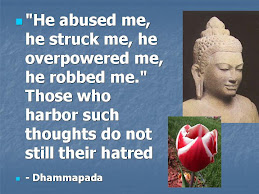

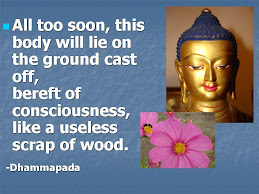
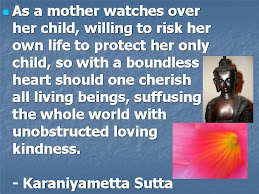
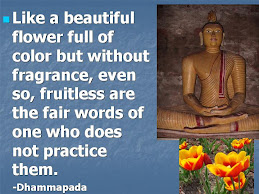
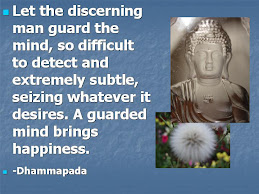

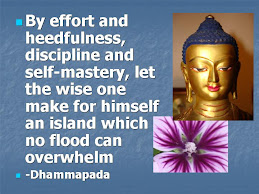

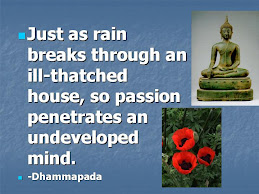


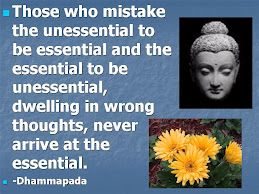
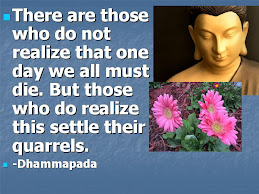
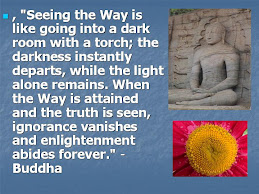

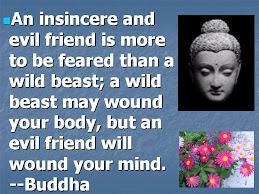
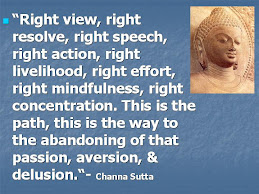

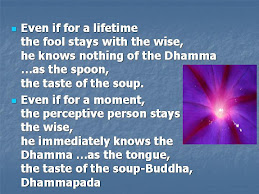



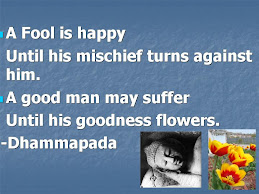
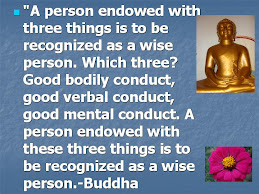

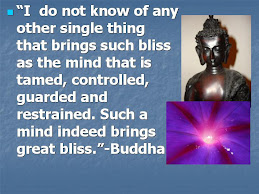
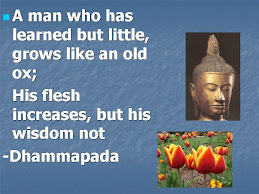
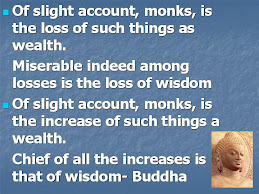

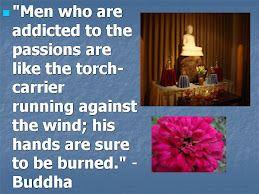


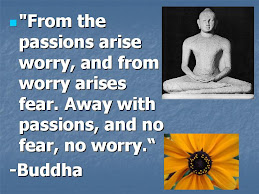
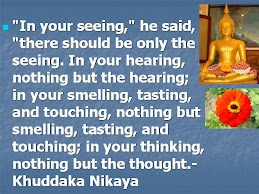




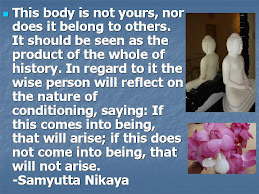
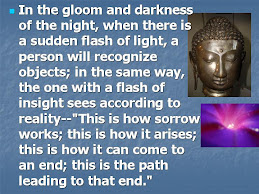
















3 comments:
a simple way of letting us know how to control anger and hatred. Seems common sense...but do we rationalise and think in that manner?
Many thanks for the valuable thoughts
with mettha
Manisha
Hi Manisha,
I think we can start with one method as outlined in the post. If it doesn't work for you then you can move on to the next one. We have very little control of the outside world as it is so large and sometimes may be overwhelming to us. Buddhist idea is to "fit the whole world" into our six senses and then we have a better control of it. You have to observe and experiment using your own mind and sensory inputs as a laboratory and understand how these things work. Practicing vipassana meditation may help in this.
Good luck
Thanks I found this useful!
Post a Comment